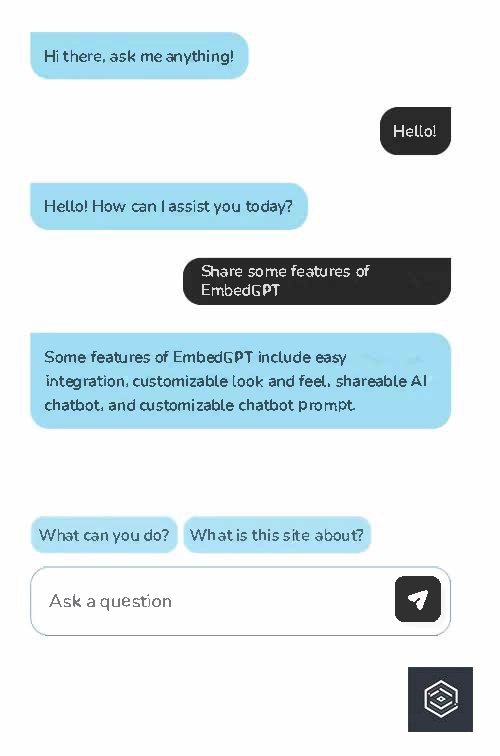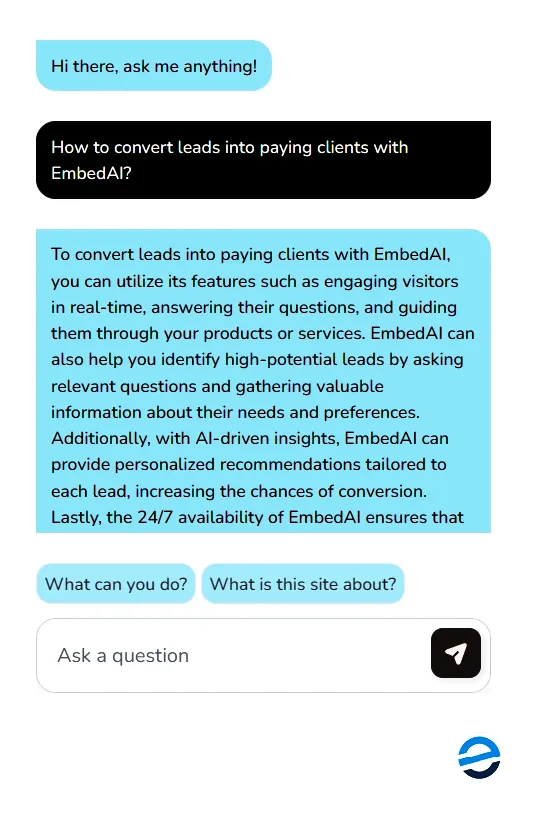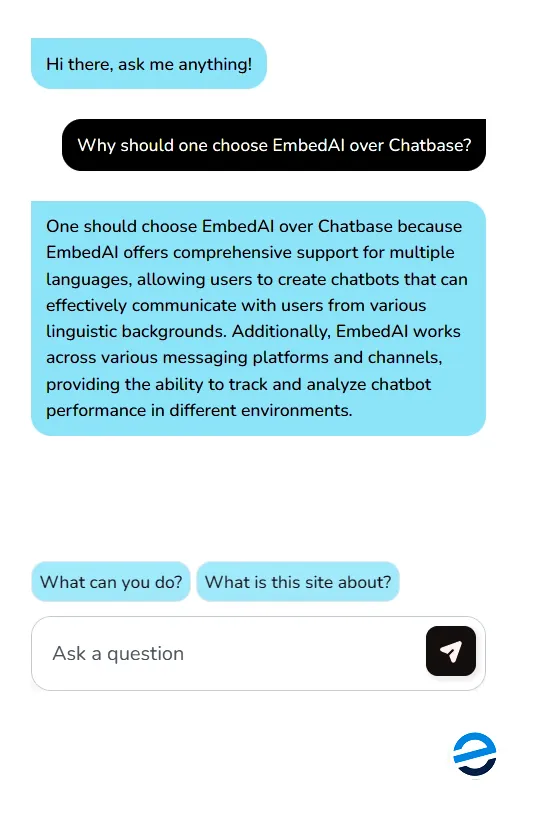Are you tired of ChatGPT and looking for alternatives to spice up your
chatbot experiences in 2024?
Look no further! In this article,
we'll introduce you to ten compelling Chatbase alternatives that
cater to various needs and preferences. Whether you're seeking a
virtual friend, creative writing assistant, or a customer support
solution, there's a chatbot alternative for you.
Benefits of using an AI chatbot:
Chatbots offer many advantages for both businesses and their
customers. They often serve as the initial contact, welcoming
customers in a user-friendly manner. Here are some advantages of using
AI chatbots:
Reduce Customer Service Costs: Businesses save on
hiring additional staff, scale support during peak times, and enhance
communication efficiency.
Personalized Responses: Chatbots
maintain customer relationships by delivering relevant and
personalized responses.
Availability: Chatbots offer instant
support 24/7, meeting customers on their schedule.
Monitor
Customer Data: Chatbots analyze customer behavior to inform marketing
strategies and collect valuable feedback.
Multilingual Support:
Chatbots can respond in multiple languages to cater to diverse
customer needs.
Boost Lead Generation: Chatbots offer 24/7
service, gather contact information efficiently, and automate sales
conversions.
Enhance Customer Engagement: AI chatbots provide
relevant and concise responses, improving customer satisfaction and
prolonging interactions.
Omni-channel Messaging: Chatbots can
assist customers on various platforms, including websites and social
media.
Understanding the Different Types of AI ChatbotsAI chatbots come in various forms, each designed to serve
specific functions and offer different levels of interaction.
Understanding these types can help businesses choose the right chatbot
for their needs. Here’s an in-depth look at the different types of AI
chatbots:
1. Rule-Based ChatbotsRule-based
chatbots, also known as decision-tree bots, operate on a predefined
set of rules. They follow a specific flow, guiding users through a
series of questions and responses based on their inputs. These
chatbots are straightforward and easy to design but are limited in
their ability to handle complex queries. The advantages of rule-based
chatbots include predictability and simplicity, as their behavior is
consistent and they are easy to set up, requiring minimal maintenance.
Additionally, they are cost-effective, making them ideal for
businesses with basic interaction needs.
2. AI-Powered ChatbotsAI-powered chatbots leverage natural language processing (NLP)
and machine learning to understand and respond to user queries more
naturally. These chatbots can learn from interactions and improve over
time. The flexibility and personalization offered by AI-powered
chatbots are major advantages, as they can handle a wide range of
queries, understand context, and offer tailored responses based on
user data. Additionally, their ability to learn from interactions
enhances their efficiency.
3. Hybrid ChatbotsHybrid chatbots combine rule-based and AI-powered approaches,
using predefined rules for simple queries and switching to AI for more
complex interactions. This combination allows for more flexibility
while maintaining a degree of control. The balanced approach of hybrid
chatbots is a significant advantage, as it merges the predictability
of rule-based bots with the adaptability of AI, making them less
expensive than fully AI-powered bots but more capable than purely
rule-based ones. They are also scalable, accommodating growing
business needs.
4. Voice-Activated ChatbotsVoice-activated chatbots are designed to interact with users
through voice commands, integrated with voice assistants like Amazon
Alexa, Google Assistant, and Apple Siri. The convenience and
accessibility of voice-activated chatbots are their primary
advantages, as they allow hands-free interaction, making them ideal
for users on the go or those with disabilities. Additionally, their
natural interaction style mimics human conversation, enhancing user
engagement.
How AI Chatbots Enhance Business OperationsAI chatbots are revolutionizing business operations by
automating tasks, improving customer interactions, and providing
valuable insights. Here’s a detailed look at how AI chatbots enhance
various aspects of business operations:
1. Customer Service Automation: AI chatbots can handle a significant portion of customer service
interactions, providing instant responses to common inquiries. This
automation reduces the workload on human agents, allowing them to
focus on more complex issues. The main advantages include 24/7
availability, cost reduction by minimizing the need for a large
customer service team, and consistent responses, ensuring uniform
quality of customer service. However, the reliance on chatbots might
also have disadvantages, such as the inability to handle highly
complex or sensitive issues that require human empathy and judgment,
potentially leading to customer dissatisfaction in certain
scenarios.
2. Sales and Lead Generation: AI
chatbots can engage with website visitors, qualify leads, and guide
them through the sales funnel. They can answer product questions,
offer recommendations, and even process orders. The advantages of this
include increased engagement, as proactive interaction can boost
conversion rates, efficient lead qualification, and personalized
recommendations based on user interactions and preferences, driving
sales. On the flip side, the disadvantages might involve initial setup
costs and the need for continuous optimization to ensure the chatbot
effectively identifies and nurtures high-quality leads.
3. Marketing and Customer Insights:
Chatbots collect valuable data from user interactions, providing
insights into customer behavior, preferences, and pain points. This
information can inform marketing strategies and product development.
The advantages include targeted marketing, as insights help tailor
campaigns to specific audience segments, real-time feedback for
identifying improvement areas, and data-driven decision-making.
However, disadvantages may include privacy concerns, as collecting and
analyzing customer data requires strict adherence to data protection
regulations and may necessitate additional security measures to
protect sensitive information.
4. Operational Efficiency:
Chatbots can streamline internal business processes by automating
tasks such as scheduling meetings, managing calendars, and providing
instant access to information. The primary advantages are time
savings, as automation frees up employees to focus on higher-value
activities, improved accuracy by reducing human error in routine
tasks, and enhanced productivity through quicker access to information
and task completion. Conversely, the disadvantages might involve the
initial investment in chatbot development and integration, as well as
the potential resistance from employees who may need time to adapt to
new automated systems.
5. Employee Training and Support: AI chatbots can assist in onboarding new employees by providing
training materials, answering common questions, and guiding them
through company policies and procedures. The advantages include
efficient onboarding, as new hires can quickly access necessary
information, continuous support for employees needing ongoing
assistance, and robust knowledge management with easy access to a vast
knowledge base. However, disadvantages may include the limitations of
chatbots in addressing more complex or nuanced training needs that
require human intervention, and the potential need for regular updates
to the training materials provided by the chatbot to ensure they
remain current and accurate.
How to Find the Best AI Chatbot?Before we dive into the alternatives, it's crucial to
understand how to identify the best AI chatbot for your specific
requirements:
1. Define Your Needs:
Determine your chatbot's purpose—customer support, information
dissemination, or just for fun. Different chatbots excel in different
areas. Remember, chatbots are designed with varied functionalities,
and identifying your primary purpose can help narrow down the ideal
options.
2.
Research and Reviews: Read online reviews and
comparisons to find chatbots with positive feedback and good
reputations. Pay attention to features like natural language
processing and sentiment analysis. These can greatly influence the
quality of interaction the chatbot provides.
3. User-Friendly Interface: Choose a chatbot with a user-friendly interface and a
straightforward setup process to save time and effort. An intuitive
and easy-to-navigate interface can make all the difference. You'd
want a chatbot that not only offers a smooth setup process but also
ensures the end-users have a pleasant experience. A user-friendly
chatbot reduces the learning curve and streamlines interactions.
4. Platform Compatibility: Ensure the chatbot
is compatible with the platforms you intend to use it on, whether
it's your website, messaging apps, or social media. Compatibility
ensures a cohesive user experience.
5.
Try Before You Buy: A great way to gauge a
chatbot's effectiveness is to test it out. Take advantage of free
trials or demos offered by providers. Test the chatbot's
responsiveness, accuracy, and ability to understand and respond to
queries.
6. Scalability: Your
business or needs might grow, and your chatbot should be capable of
growing with it. Select a chatbot that can handle increased traffic
and offers customization and expansion options. This ensures that as
your requirements evolve, your chatbot remains relevant.
7. Customer Support: Opt for a provider that offers reliable customer support for
assistance and troubleshooting. The backing of robust customer support
is invaluable. There might be times when you encounter issues or need
guidance.
What are the benefits of seeking out Chatbase alternatives?
Opting for an alternative to Chatbase can offer numerous benefits,
addressing the shortcomings inherent in Chatbase itself. These
substitutes often provide enhanced functionalities, greater
customization capabilities, and improved integration options. Below
are reasons why exploring a Chatbase alternative might be
advantageous, accompanied by a more detailed overview of some
alternatives:
Limited Customization: While
Chatbase offers a foundational framework for chatbot development, its
customization options may prove insufficient for businesses with
specific branding requirements and diverse operational needs.
Alternative platforms often provide more extensive customization
tools, allowing businesses to tailor their chatbots to align
seamlessly with their brand identity and meet their unique customer
interaction preferences.
Complex Interface:
Navigating Chatbase's interface can be challenging for users,
particularly those lacking prior experience in chatbot development.
The platform's interface may lack intuitiveness and user-friendly
features, leading to difficulties in configuring and managing chatbots
effectively.
Cost of Advanced AI Models: While
Chatbase utilizes GPT-3.5 as its default AI model, businesses seeking
access to more advanced AI capabilities, such as GPT-4 or custom
models, may face significant additional costs. Other platforms may
offer more customizable pricing structures, allowing businesses to
choose the AI capabilities that best suit their needs and budget.
Absence of Multi-Bot Creation: Businesses
requiring multiple chatbots for distinct purposes may find Chatbase
restrictive, as it lacks support for multi-bot creation and
management. Alternative platforms often offer more robust multi-bot
management features, allowing businesses to create and deploy multiple
chatbots seamlessly across various channels and use cases.
Integration Constraints: Chatbase's
integration capabilities with prevalent CRM, e-commerce, and social
media platforms may be limited, hindering seamless communication
between the chatbot and customers across different channels. Other
platforms frequently provide broader integration options, enabling
businesses to connect their chatbots with a wide range of third-party
services.
Now, let's explore ten of the best Chatbase
alternatives:
1.
ChatwithMyWebsite
ChatwithMyWebsite is an AI
chatbot builder suitable for websites. It allows users to create
chatbots that can be trained on their knowledge base and integrates
seamlessly with a simple copy-paste of the embed code.
ChatwithMyWebsite supports multiple languages and offers additional
features like YouTube video transcription and PDF document
summarization. Its notable features include seamless integration into
your website or application, customization to match your brand's
tone and style, multilingual support, and intelligent chatbot
responses.
Pricing: ChatwithMyWebsite offers a free
7-day trial, during which you can test out the plan you are interested
in. It has three paid plans starting at $19 per month.
2.
ReplikaReplika Chatbot is all
about creating engaging and natural conversations. It's trained
on extensive data to understand and respond to messages in a
conversational manner. Users can ask questions, have deep discussions,
or simply have fun chats on any topic. It even remembers previous
conversations, making interactions feel seamless. It has a sizable
user base worldwide and is accessible on both the iOS and Android
operating systems.
Pricing: Replika offers three paid
plans starting at $19.99 per month.
3.
Snapchat My AISnapchat's
AI enhances the user experience within the app. It suggests filters
and lenses based on context, recognizes faces and objects in snaps,
and offers features like the Snap Map to see where friends are and
discover new places and events. Powered by OpenAI's models, it
delivers a user experience reminiscent of ChatGPT. To engage with My
AI, simply open the app and select the chat icon, leading to the My AI
conversation.
Pricing: Snapchat My AI is free for all
users.
4.
MyGPT by WhisperAiMLMyGPT by WhisperAiML
is a powerful ChatGPT alternative designed to assist and inspire users
in various domains, including writing, brainstorming, and
conversation. It offers session management, chat history, and a prompt
library, making it a versatile tool for various tasks. The platform
boasts a simple and user-friendly interface, ensuring ease of use for
all users. One of its unique features is the ability to utilize
ChatGPT plugins without requiring a ChatGPT Plus subscription.
Pricing: MyGPT by WhisperAiML offers a free 7-day trial,
during which you can test out the plan you are interested in. It has
two paid plans starting at $5 per month.
5.
Jasper Jasper Chat engages in
conversations and provides assistance on various topics. It is a
chatbot platform that allows businesses to create customized chatbots
to improve customer interactions. It is a simple platform that
doesn't need any coding knowledge to utilize. Users can ask
questions, share thoughts, or discuss different subjects, and Jasper
aims to provide informative and engaging responses.
Pricing: Jasper offers a free 7-day trial, during
which you can test out the plan. It has three paid plans starting at
$39 per month.
6.
Chatsonic
Chatsonic AI
is a chatbot that uses artificial intelligence to engage in
conversations with users. The platform gives customers a personalized
experience by utilizing machine learning (ML) and natural language
processing (NLP) technologies. It's designed to be easy to use
and is available on various platforms, including Snapchat. Chatsonic
learns from user responses to provide personalized answers, making it
a virtual friend you can chat with anytime.
Pricing: Chatsonic offers a free trial where you
receive 25 credits (one-time), 50 generations per day, and more. The
paid plan starts at $20 per month.
7.
Bard AI Bard AI is developed
by Google and uses large language models to generate creative and
poetic text. It's ideal for writing stories, poems, and more. It
utilizes a generative AI approach to fulfill text-based tasks such as
answering questions, providing summaries, and generating various types
of content. It is powered by PaLM 2, an advanced large language model
(LLM) developed by Google. Bard AI can also answer questions and
engage in informative conversations. Bard AI is now Gemini.
Pricing: Gemini is free for all users, while Gemini
Advanced costs $23.5.
8.
OpenAI Playground OpenAI Playground is a virtual sandbox for experimenting with AI models. It provides
access to models like GPT-3, enabling users to generate text, have
interactive conversations, and experiment with language-based tasks.
It's an excellent platform to experiment with GPT's
capabilities, whether you want to refine your prompting skills, gain
insights into AI language models, or test the potential of an
AI-driven app business.
Pricing: OpenAI Playground
offers a detailed pricing structure with various services and models
tailored to different tasks and needs. For more information on
pricing, visit their website.
9.
Claude AIClaude AI is a chatbot with a charming
personality and a knack for humor. It can assist with tasks like
searching, writing, and coding, all while striving to minimize
potentially harmful responses. It provides a more conversational and
insightful experience compared to ChatGPT, offering both depth and
simplicity in its responses. It can also engage in playful banter,
crack jokes, and provide informative responses, making it an enjoyable
chat companion.
Pricing: Claude AI offers a Claude
Pro subscription for $20 per month. Detailed pricing based on
different models is available on their website.
10.
Personal AI Personal AI offers
users a virtual assistant that can manage schedules, send reminders,
answer questions, and provide recommendations. It's like having a
knowledgeable friend always at your service. It customizes itself by
learning from your inputs, encompassing messages, documents, and even
your favorite links. In conclusion, while ChatGPT is a powerful
chatbot, there are numerous alternatives available to meet your
specific needs and preferences.
Pricing: Personal AI
offers a free plan with limited features, and its paid plan starts at
$40 per month.
In addition, we are introducing DanteAI as
another great alternative to Chatbase.
DanteAI:
DanteAI stands out as an equally viable option among those mentioned
above. It is an innovative chatbot builder that empowers users to
create personalized AI chatbots tailored to their specific data,
without any coding expertise. This platform is compatible with various
messaging services and offers seamless integration into websites.
DanteAI distinguishes itself with its versatility, supporting over 100
languages and a range of file types for building comprehensive AI
knowledge bases. DanteAI maintains high-security standards, utilizing
encrypted AWS servers for data storage. The service is available in
both freemium and paid subscription formats, offering pricing options
that include monthly and annual billing to cater to diverse user
requirements. While DanteAI is an excellent chatbot builder, you may
also explore another
DanteAI Alternative which is
the preferred choice among chatbot seekers these days.
Whether
you're looking for a virtual friend, a creative writing
assistant, or a versatile customer support solution, these
alternatives offer a diverse range of features and capabilities to
enhance your chatbot experience in 2023. Explore these options and
discover the one that suits you best!
Future Trends in AI Chatbots
As we delve deeper into the artificial intelligence era, AI chatbots
are rapidly transforming. They're moving beyond traditional
customer service roles, towards more sophisticated and engaging user
interactions. In the near future, we can expect several significant
trends to emerge, reshaping how we interact with AI chatbots, much
like the innovations seen with platforms like ChatwithMyWebsite. Here
are the key trends to look out for:
Enhanced Natural Language Processing (NLP):
The evolution of AI chatbots is closely linked to advancements in
Natural Language Processing (NLP). These advanced bots will better
understand and process human language, grasping context, sentiment,
and subtle nuances more accurately. This will lead to more natural and
human-like interactions.
Personalization and Predictive Analytics:
AI chatbots of the future will specialize in offering highly
personalized experiences. By integrating with CRM systems and
harnessing the power of machine learning, they'll be able to
predict user needs and preferences, providing custom recommendations
and support.
Blockchain for Enhanced Security:
With growing concerns over data security, future AI chatbots may
incorporate blockchain technology. This would ensure the integrity and
confidentiality of user interactions, building trust and addressing
privacy issues, especially with sensitive information.
Voice-Enabled Interactions:
The increasing popularity of voice technology will enable AI chatbots
to handle voice-based interactions more proficiently. This will make
chatbots more accessible through voice assistants and IoT devices,
increasing their utility in daily life.
Focused AI Ethics and Privacy:
As we rely more on AI chatbots, the emphasis on ethical AI practices
and data privacy will intensify. Future chatbots are expected to be
transparent about data usage and ensure secure interactions,
alleviating concerns about AI and user privacy.
In summary, the
future of AI chatbots is marked by sophisticated language processing,
heightened personalization, seamless omnichannel presence, voice
interaction capabilities, and a steadfast commitment to ethical AI and
data security. These advancements not only elevate user experience but
also redefine how businesses interact with and understand their
customers, forging a path towards a more connected and responsive
digital landscape. Embrace the transformation and stay ahead in the
evolving world of AI-driven interactions.














